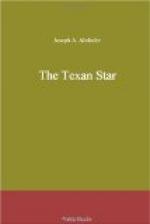The wheel ceased presently to revolve, and Ned saw Urrea again, torch in hand, but motionless. He, too, was waiting. He did not stir for a full quarter of an hour, but all the while the torch burned steadily. Then he suddenly began to whirl it again, but in a direction opposite to that made by the first wheel of fire. Around and around went the burning brand for some minutes. When he stopped, he waited at least ten minutes longer. Then, as if he had received the answer that he wished, making the claim of communication complete, he dropped the torch. Ned saw it falling, a trail of light, until it struck among the bushes, where it went out. Then Urrea began to descend the tree, but he came down more slowly than he had gone up.
Ned slipped forward, seized Urrea’s rifle, and then slipped back among the bushes. He put the Mexican’s weapon at his feet, cocked his own and waited.
Urrea, coming slowly down the tree, stopped and stood there for a few moments as if in contemplation. A shaft of moonlight piercing through the foliage fell upon his face illumining the olive complexion and the well-cut features. It was hard for Ned to believe what he had seen. What could it be but a signal? and that signal to the enemies of the Texans! And yet Urrea did not look like a villain and traitor. There was certainly no malevolence in his face, which on the other hand had rather a melancholy cast, as he stood there on the bough before swinging to the ground.
Ned strengthened his will. He had seen what he had seen. Such things could not be passed over in times when lives were the forfeit of weakness. Urrea let himself lightly to the earth, and stooped down for his rifle. It was not there, and when he straightened up again Ned saw that his face was ghastly pale in the moonlight. Urrea, with his quick perceptions, was bound to know from the absence of the rifle that he had been followed and was caught. His hand went down toward his belt where a pistol hung, but Ned instantly called from the bush:
“Hands up, Don Francisco, or I shoot!”
His tone was stern and menacing, and Urrea’s hands went up by the side of his head. But the paleness left his face, and his manner became careless and easy.
“Is that you, Ned?” he called in the most friendly tones. “Is it a joke that you play upon me? Ah, you Anglo-Saxons, you seem rough in your play to us Latins.”
“It is no joke, Don Francisco. I was never more earnest in my life,” said Ned, stepping from the bush, but still keeping Urrea covered with his rifle. “Your merits as a climber of trees are great, but you interested me more with your wheel of fire. I think I can account now for your absences, when any fighting with the Mexicans was to be done. You are a spy and you were signaling with that torch to our enemies.”
Urrea laughed lightly, musically, and he regarded Ned with a look of amusement. It seemed to say to him that he was only a boy, that one so young was bound to make mistakes, but that the Mexican was not offended because he was making one now at his cost. The laugh was irritating to the last degree, and yet it implanted in the boy’s mind a doubt, a fear that he might have been mistaken.




